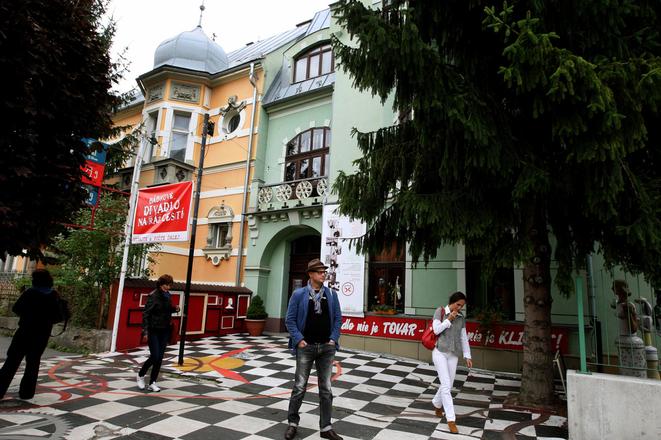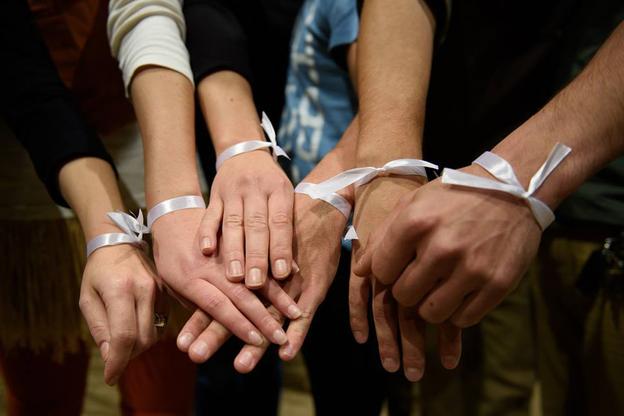His latest actions have put the operation of several regional cultural and educational institutions in danger and the theatre community is now comparing the atmosphere to that of the communist era.
Bábkové Divadlo na Rázcestí (BDnR), a puppet theatre, received a grant of €6,985 from the Foreign Affairs Ministry for a project titled Stop to Extremism concerning the problems of extremism, xenophobia and racism in society. The authors wanted to address secondary school students from economically weaker municipalities in the region and prepared a play and a course together with Amnesty International.
Kotleba, however, refused to sign the contract, complaining about the presence of Amnesty International and the way the project wanted to present the issue. Under current rules, all grant agreements must be signed by the regional governments if they own the theatres.
As the second case in the past few months, the theatre launched a silent protest, wearing white ribbons. The initiative has been supported by numerous professional and non-professional theatres in Slovakia, which came somewhat as a surprise to BDnR Director Iveta Škripková.
“On the other hand, we realise the support we have, born unexpectedly, that is a sign of a coalition against extremism and radical, totalitarian governance of culture, but of course not only culture,” Škripková told The Slovak Spectator.
Kotleba rejected any accusations of trying to interfere with the rights of artists to create freely.
“One thing is free creation, which of course everybody can do,” Kotleba said, as quoted by the TASR newswire. “Another thing is my opinion on using money from the state budget, money from all taxpayers. When I, as governor, do not sign some agreement, which is my right, it is absolutely exaggerated and theatrical to talk about suppressing creativity.”
Support from many sources
The Divadlo Štúdio Tanca dance theatre had a similar experience in August. At the time Kotleba refused to sign a €20,000 grant from the Culture Ministry. The theatre had been tasked with organising the 11th year of the Days of Dance for You festival. Kotleba said that he was not interested in the development of this genre which he referred to as decadent art.
Since it was unable to continue its preparations, the theatre cancelled the event. Since the region had also blocked grant money from the Culture Ministry, its entire existence was placed in jeopardy, the Denník N daily wrote.
Divadlo Štúdio Tanca was among the first to support the initiative launched by BDnR. Then representatives of several cultural institutions from Banská Bystrica met in late September and issued a statement protesting Kotleba’s practices and launched a public collection to support BDnR.
Together 18 professional theatres, 10 non-professional and independent theatres and more than 20 artistic and non-artistic theatres and associations from Slovakia and the Czech Republic have officially supported the statement. Some theatres, including the Slovak National Theatre in Bratislava (SND) and Divadlo Astorka Korzo ´90, promised to give the money from some of their performances to support cultural activities in Banská Bystrica region (BBSK), according to a statement published on the BDnR website.
“We think that the main aim of the grant system is to contribute to freedom of speech and to create the space for promoting a broad spectrum of art production that reflects the present, the problems of this world, and brings various artistic statements,” Roman Polák, head of the SND’s drama section, said in a statement.
The decisions in BBSK have also been criticised by Culture Minister Marek Maďarič who considers them “non-cultural and unacceptable wilfulness”.
“Most of the cultural grants in 2016 will be allocated from the newly-founded Fund to Support Art,” the Culture Ministry informed in a press release, adding that regarding subsidies for BBSK the contracts will now be signed directly with the recipients.
Activities to continue
BDnR meanwhile received €1,629 via a public collection and asked for a subsidy from the Orange Foundation. In addition, members of the BBSK regional parliament donated about €7,000 to the theatre. The theatre wants to use the money to implement the project as well as for new projects or performances, Škripková said.
The performance planned within the project, based on The Letter to a Black Son by Irena Brežná, will be staged in SND on October 24 and will be followed by discussions about the current situation in BBSK.
BDnR will also perform its play examining domestic violence in the Jonáš Záborský Theatre in Prešov in November and actors from Divadlo Astorka Korzo ´90 will stage their To Whom the Word Fits performance, which was written as a metaphor on power, its destructive effects and the evil it brings, in Banská Bystrica in December.
The theatres are not the only institutions in BBSK that have been denied financial support. According to BDnR, several other grant projects have been scrapped. The theatre has asked the regional cultural committee to call on Kotleba to publish how many agreements he has declined to sign. Thus far it has not received an answer.
Others lacking support
Among other endangered institutions are secondary schools. BBSK proposed not opening the first-year classes at 11 institutions, including vocational and grammar schools.
Kotleba said that the proposal was based on the suggestion of the Regional Council for Vocational Education that had recommended reform of education in the region, while adding that the education sector is becoming worse and does not respond to labour market needs, TASR wrote.
Several regional deputies and the education committee of BBSK opposed the adoption of the plan and came with a new proposal, reducing the number of affected schools to four. The proposal, however, was scrapped from the October 9 session. Kotleba said he would not sign the document even if the deputies agreed on it and passed all amending proposals, TASR wrote.
They now want to work on a new document that should be discussed at the next session of the regional parliament, Kotleba said, adding he is ready to make concessions only for vocational schools.
As a result of Kotleba’s controversial decisions and his governing style, there is speculation that BBSK may become the only one of Slovakia’s eight regional governments stripped of its ability to administer funds from the European Union. Kotleba demonstrated his negative attitude towards the EU by ordering its EU flag to be removed from the regional offices. He has also paid little attention to receiving EU funds, which represent a significant source of money for various infrastructure projects at the regional level, including construction and renovation of roads and schools.
Prime Minister Robert Fico said BBSK has been lagging behind in drawing EU funds after his cabinet had convened an away-from-home session in Banská Bystrica at the end of February. He pointed the finger directly at Kotleba as the reason.



 Bábkové Divadlo na Rázcestí (source: SME)
Bábkové Divadlo na Rázcestí (source: SME)
 (source: Courtesy of Bábkové Divadlo na Rázcestí)
(source: Courtesy of Bábkové Divadlo na Rázcestí)